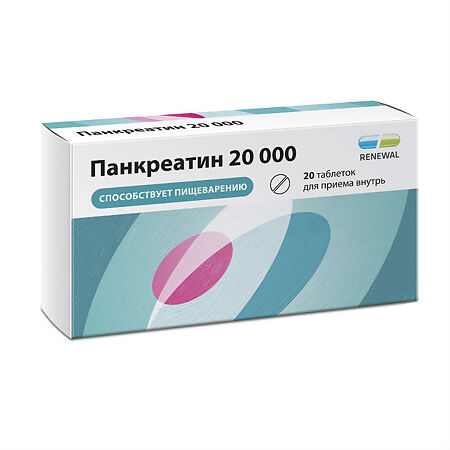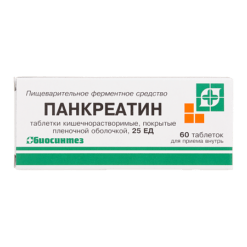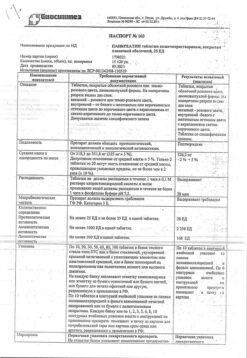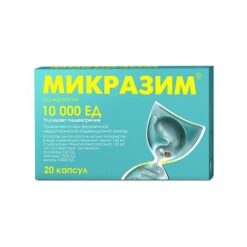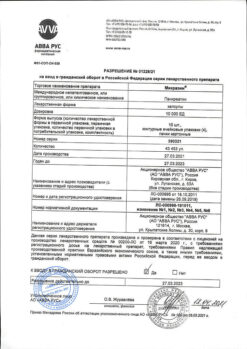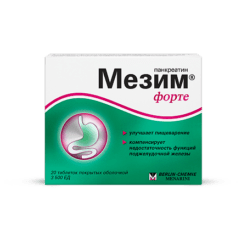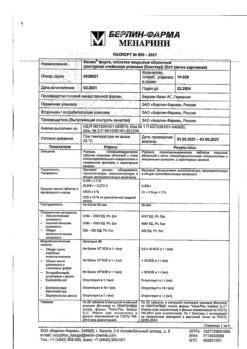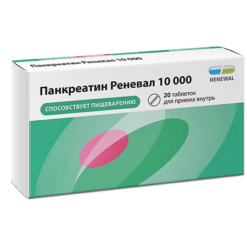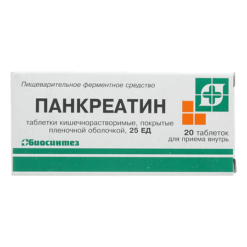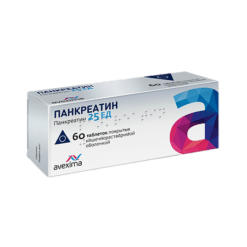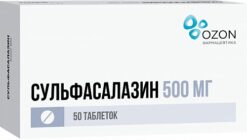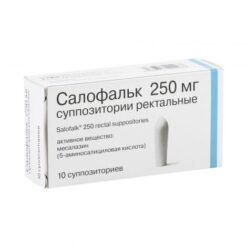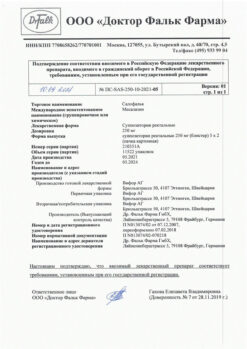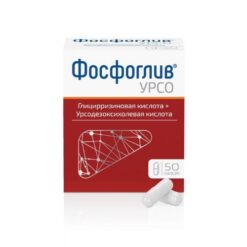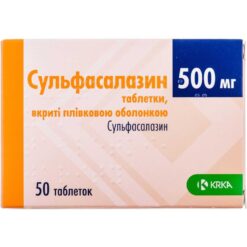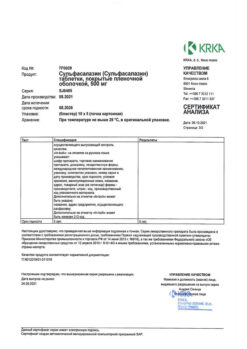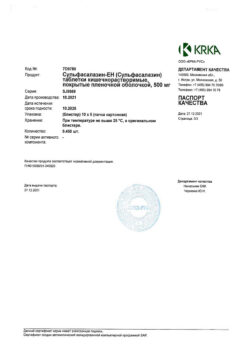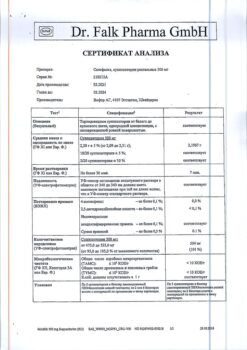No products in the cart.
Pancreatin 20000,20000 units 20 pcs
€7.07 €6.19
Description Pharmacotherapeutic group: Digestive enzyme drug Pharmacodynamics:
ATC:
< section>
A.09.A.A Enzyme preparations
A.09.A.A.02 Pancreatin
Pancreatin is a powder from the -pancreatic glands of pigs. The pancreatic enzymes contained in pancreatin have proteolytic, amylolytic and lipolytic effects and contribute to the breakdown of proteins, fats and carbohydrates and improve the functional state of the gastrointestinal tract (GIT), thus normalizing digestive processes.
< section>Pharmacokinetics:
Pancreatin 20,000 tablets are covered with an acid-resistant coating that is resistant to gastric hydrochloric acid and thus protects the pancreatic enzymes contained in the drug from inactivation. Dissolution of the enteric membrane and release of enzymes occurs at neutral or slightly alkaline pH values. Pancreatic enzymes are not absorbed from the gastrointestinal tract.
Indications
Indications
– Lack of external pancreatic secretory function (chronic pancreatitis, cystic fibrosis and others);
– chronic inflammatory-dystrophic diseases of the stomach, intestines, liver, gallbladder;
– conditions after resection or irradiation of the gastrointestinal organs, accompanied by disorders of digestion, flatulence, diarrhea (in combination therapy);
– for improving digestion in patients with normal GIT function in case of poor diet;
– preparation for X-ray and ultrasonic examination of the abdominal cavity;
– Gastrointestinal disorders of functional nature (with acute intestinal infections, irritable bowel syndrome and others).
Active ingredient
Active ingredient
Composition
Composition
Per tablet:
The active ingredient:
Pancreatin – 250,000 mg, corresponding to the enzymatic activity: lipase – not less than 20,000 units, amylase – not less than 12,000 units, protease – not less than 900 units
Excipients:
Lactose monohydrate – 203,200 mg,
Microcrystalline cellulose – 104,000 mg,
Crospovidone – 36,000 mg,
magnesium stearate – 3.734 mg,
colloidal silicon dioxide (aerosil) – 3.066 mg
Shell composition: methacrylic acid and ethyl acrylate copolymer (1:1) – 21.658 mg, talc – 13.085 mg, titanium dioxide – 8.969 mg, hypromellose – 8.520 mg, triethylcitrate – 6.910 mg, polysorbate 80 (tween 80) – 1.200 mg, sodium carmellose (sodium carboxymethylcellulose) – 0,750 mg, simethicone emulsion 30% (dry weight) – 0.586 mg, “vanilla” flavoring – 0.463 mg, macrogol 6000 (polyethylene glycol 6000) – 0.341 mg, “bergamot” flavoring – 0.218 mg
How to take, the dosage
How to take, the dosage
The daily dose of pancreatic enzymes corresponding to 15000-20000 IU of lipase/kg body weight should not be exceeded.
The dose should only be increased under medical supervision, taking into account the symptoms (e.g. reduction of steatorrhea and abdominal pain). The length of therapy is determined by the physician, and varies from a few days (if indigestion is caused by poor diet) to a few months or even years (if continued replacement therapy is necessary).
In children, the dosage is determined by the doctor.
Dose for children and adults with cystic fibrosis
In patients with cystic fibrosis, the dose should be adjusted to the severity of the symptoms, the results of steatorrhea control and maintenance of adequate nutritional status (see section “Special Precautions”).
The dose should not exceed 10000 IU of lipase/kg body weight per day.
In children, the dosing regimen and duration of treatment are determined by the physician depending on the severity of digestive disorders and the composition of the diet, at the rate of 1000 IU of lipase/kg of child body weight at each meal for children under 4 years of age and 500 IU of lipase/kg of child body weight at each meal for children over 4 years.
If there is no improvement after treatment, or if symptoms worsen, or if new symptoms develop, you should consult a physician.
To use the drug only according to the indication, route of administration, and dosage listed in the directions.
Interaction
Interaction
Possible decrease in absorption of folic acid in concomitant use with pancreatin preparations.
Special Instructions
Special Instructions
Patients with cystic fibrosis, especially when taking high doses of pancreatin, may have hyperuricosuria, so urinary uric acid concentrations should be monitored in this group of patients.
Strictures in the ileocecal and ascending colon have been described in this group of patients.
As a precautionary measure, a medical examination should be performed if unusual abdominal discomfort or changes in the nature of complaints occur, especially if more than 10,000 units of lipase/kg body weight per day are taken.
Pancreatin 20,000 contains active enzymes which, if released in the oral cavity, e.g. when chewed, may damage the oral mucosa (up to and including ulceration). Therefore, the tablet must be swallowed whole.
Influence on the ability to drive vehicles and other mechanisms:
Pancreatin 20 000 has no effect on the ability to drive vehicles and other mechanisms.
Contraindications
Contraindications
– Hypersensitivity to any of the components of the drug;
– Acute pancreatitis or chronic pancreatitis in the acute phase. However, it is possible to use in the phase of waning exacerbation with expansion of the diet, if there are signs of digestive disorders;
– hereditary galactose intolerance, lactase deficiency or glucose-galactose malabsorption syndrome;
– childhood under 3 years (for this dosage form).
Side effects
Side effects
Possible side effects are listed below in descending frequency of occurrence: very common (â¥1/10), common (â¥1/100 to < 1/10), infrequent (â¥1/1000 to < 1/100), rare (â¥1/10000 to < 1/1000), very rare (to < 1/10000), frequency unknown (cannot be estimated from available data).
Immune system disorders
Very rare: immediate allergic reactions (such as skin rash, urticaria, sneezing, lacrimation, bronchospasm, dyspnea), GI hypersensitivity.
Gastrointestinal disorders
Very rare: diarrhea, abdominal discomfort, abdominal pain, nausea, vomiting; stricture formation in the ileocecal and ascending colon in patients with cystic fibrosis when using high doses of pancreatin.
Urogenital system disorders
Prevalence unknown: hyperuricosuria (see section “Special Precautions”).
If you experience or worsen the side effects listed in the instructions, or if you notice any other side effects not listed in the instructions, tell your doctor.
Overdose
Overdose
Symptoms: hyperuricosuria, hyperuricemia (especially in patients with cystic fibrosis taking high doses of enzyme drugs).
Treatment: symptomatic therapy, withdrawal of the drug.
Pregnancy use
Pregnancy use
Similarities
Similarities
Additional information
| Weight | 0.025 kg |
|---|---|
| Shelf life | 3 years. Do not use after the expiration date. |
| Conditions of storage | At a temperature not exceeding 25 ° C. Store out of the reach of children. |
| Manufacturer | Update PFC AO, Russia |
| Medication form | enteric soluble tablets |
| Brand | Update PFC AO |
Other forms…
Related products
Buy Pancreatin 20000,20000 units 20 pcs with delivery to USA, UK, Europe and over 120 other countries.

